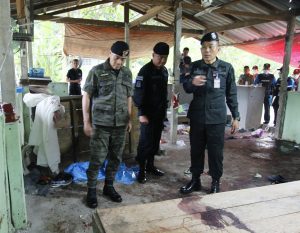Last week, the government of Thailand and rebels concluded a second round in a new phase of direct peace talks on a long-running southern insurgency that kicked off earlier this year. The negotiations spotlighted the struggle faced by all sides to end the violence in one of Asia’s deadliest ongoing conflicts.
As I have observed before in these pages, despite the rise of a new wave of violence in Thailand’s Malay-Muslim majority southernmost provinces since 2004 that has left over 7,000 dead in what is one of Asia’s deadliest ongoing conflicts, multiple rounds of talks between the government and insurgents, at times with facilitation of neighboring Malaysia, have been held to no avail. But since the beginning of the year, the Thai government has been participating in a new phase of direct peace talks with southern rebels which include the National Revolutionary Front (BRN) – the most powerful of the rebel groups in southern Thailand which had previously been excluded.
Last week, the ongoing state of talks was in the headlines again with the conclusion of the second round of direct peace negotiations held in the Malaysian capital of Kuala Lumpur on March 2 and 3, following the first round of talks that were held in January. This came after talks between the Thailand team led by chief Thai peace negotiator Wanlop Rugsanoah and a panel from the BRN led by Anas Abdulrahman.
Per a statement by the Thai National Security Council’s Secretariat for the Peace Dialogue in the Deep South, the overall atmosphere of the meeting was “constructive,” with both sides discussing technical and administrative issues and beginning to delve into “substantive issues including reduction of violence in order to create a conducive environment for the process.” The statement also cautioned that substantive talks “will require time, continuity and supports from all sectors involved, and the two sides will meet to discuss further details of all the issues in due course.”
That caution is understandable. Previous attempts at talks have floundered multiple times in the past over differing views, and it has been difficult to even keep up basic commitments such as temporary lulls in violence. There are also structural issues that have often complicate such peace talks in the past, be it the difficulty for Thailand to satisfy insurgency demands like devolution or autonomy, the challenge of preserving incremental gains in the fact of spoilers on both sides, and changes of government in Thailand as well as Malaysia.
Of course, this should not detract from any progress that may be made. But it should serve as a reminder that resolving this long-running insurgency will require both serious compromises from both sides that can stick as well as alignment of circumstances that can foster peace rather than undermining it.

































